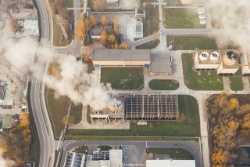Smart street lighting can deliver better outcomes
Smart street lighting can deliver better outcomes
Street lighting management consultancy,
Strategic Lighting Partners, strongly endorses calls to
establish an expert panel to examine street lighting options
for Dunedin that will take account of all the city’s
needs.
Strategic Lighting Partners Director Bryan King says, “Street lighting is a public service that has a diverse range of interest groups and it is important to ensure that the needs and preferences of all relevant groups are heeded and balanced.”
He says, “ Street lighting technologies have been through a total transformation in recent years and there are major safety, economic, tourism and environmental advantages available from the well-considered deployment of modern techniques.The outcomes for dark skies and for tourism do not need to be impaired and astute deployment of modern technologies may well enhance the interests of these parties.” “Modern street lighting design is about providing the right light, at the right place, at the right time. Well-designed LEDs with smart control systems can deliver this and save a great deal of energy and money at the same time” says Bryan King, who is a member of the Australia/New Zealand standards committee for street lighting and a member of the International Electrotechnical Commission standards committee for street lights.
“LED street lights with affordable internet based smart control systems can switch public lighting on or off at will, or adjust light levels up-or-down, location-by-location exactly in accord with the needs of public safety and security while also achieving lower overall environmental impacts”.
“Most LED street lights have “full cut-off” optics where, unlike most traditional streetlights, the proportion of direct spill light pointing skywards is greatly minimised. Additionally, warm white light LED options are now available that are more dark-skies friendly than the earlier generation of cool white light LEDs. With the use of best practice technology and design, there is no need for the attainment of safety and economic benefits for ratepayers to be at the expense of poor environmental outcomes”.
ends


 Brewers Association: Brewers Association Of New Zealand Supports Modernisation Of Alcohol Legislation
Brewers Association: Brewers Association Of New Zealand Supports Modernisation Of Alcohol Legislation Commerce Commission: ComCom Warns Of Pyramid Schemes After South Auckland Scammers Plead Guilty
Commerce Commission: ComCom Warns Of Pyramid Schemes After South Auckland Scammers Plead Guilty MBIE: MBIE Publish Mid-Point Review Of The Phase-Out Of The Low Fixed Charge (LFC)
MBIE: MBIE Publish Mid-Point Review Of The Phase-Out Of The Low Fixed Charge (LFC) Science Media Centre: Company Claims To Have “De-Extincted” The Dire Wolf – Expert Reaction
Science Media Centre: Company Claims To Have “De-Extincted” The Dire Wolf – Expert Reaction Stats NZ: Greenhouse Gas Emissions Fall 2.0 Percent In The December 2024 Quarter
Stats NZ: Greenhouse Gas Emissions Fall 2.0 Percent In The December 2024 Quarter The Reserve Bank of New Zealand: Christian Hawkesby Appointed As Governor Of The RBNZ
The Reserve Bank of New Zealand: Christian Hawkesby Appointed As Governor Of The RBNZ



